


Women's Right to Space in the Mosque
A Mosque is a sacred space dedicated to the One Creator of both male and female. Under the ownership of Allah, His house gives all His servants the right for refuge and prayer whether they be white or black, tall or short, young or old, male or female. This is proven in the following verse:
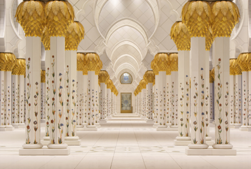
"Children of Adam, take your pleasantness to every Mosque." (Qur'an 7:31)
The address, "Children of Adam" includes all denominations of mankind including women. Therefore, Allah also asks them to attend the Mosques of Allah and be a part of the worshipping believers.
"O Mary,
be obedient to your Lord, prostrate and bow (before your Lord)
with those who bow (before Him)" (Qur'an 3:43)
Across the Muslim world, the perception of women varies geographically - namely how much a society, more specifically, the men are tolerant and 'human' towards the presence of women. This in turn affects how easily a woman's presence is taken inside a Mosque since in most occasions mosques are being maintained by men. In some mosques of the world, especially in the west, men who attend the mosques are very conservative when it comes to allowing women into the mosque, or accommodating them for prayer.
Many Mosques do not have provision for women at all. Others have small allocated areas. However, when there is a need for space, those areas are easily blocked off to them giving various excuses from extra-Quranic sources. It is often religiously taught that the women's right to the space inside a Mosque is less than that of a man.
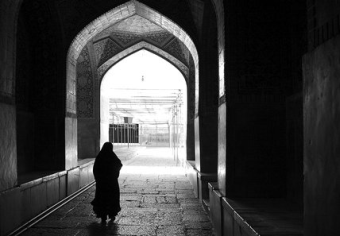
It is not uncommon to see scenarios where a woman or a group of women are denied access to a Mosque at the door for whatever reason. Even when the only request of her is to pray to her Lord.
Men who are in charge of Mosques may behave unwisely in various ways. It may be that a Mosque that did allow women is taken over completely by men on the day, such as for Friday prayers, or women's area has become full (while men's area has plenty of space), or simply the men give excuse that the Mosque was never "designed" for women altogether. Yet for each of these cases, there is always room to accommodate fellow believing women if the intention is there and if the correct believer model existed within the male attendants.
For example, usually if the women's area is full, they are turned away even though there are plenty of mosque areas still left to accommodate them but are labelled 'male'. They are not accommodated simply out of fear of male-female eye-contact if they are given a space in view of the men. These behavioural patterns are un-Quranic, since it supersedes the appreciation of the need for a believer to perform their prayers, submit and glorify Allah and prostrate to Him. This is due to them letting emotional and un-Quranic sources interfere with the correct thoughts of seeing a believing woman as a fellow believer in Allah and Qur'an. Because people do not follow the psychology and believer mental model taught by the Qur'an, they are unable to respect a woman's equal rights to pray in Allah's house. A believing man is courteous and will do his best to make sure that discriminating in Allah's servants in getting into Allah's house does not happen. This is because of his knowledge of Allah's verses. For example:
"As to those who have rejected, and would keep back (people) from the Way of Allah, and from the Sacred Mosque, which We have made (open) for all people ("An-Nas" - men and women) - equal is the dweller there and the visitor. Any whose purpose therein is profanity or wrong-doing - We make them taste a painful punishment". (Qur'an 22:25)
The sacred Mosque here, in reference to Masjid Al-Haram also refers to all other Mosques in the world - since in building every Mosque we are trying to capture the spirit of Masjid Al-Haram - the first known Mosque. By using the word "Nas" (people / mankind), Allah refers to accommodating all of mankind including women and stresses the equality of the visitors. Therefore, true believers are aware that Mosques are for women just as much as they are for men. It does not satisfy a believing man's conscience that half of the believing population may have inadequate access to the house of Allah or made to feel unwelcomed while he is able to feel comfortable within it. Ultimately, all these issues are only the side effects of people's lack of a true relationship with the contents of the Qur'an, and ultimately Allah. Allah further states the severity of restricting women:
"And who is more unjust than he who forbids the places for the worship of Allah (Mosques), wherein Allah's name should be celebrated? Whose zeal is (in fact) to ruin them? It was not fitting that such should themselves enter them except in fear. For them there is nothing but disgrace in this world, and in the world to come, an exceeding torment." (Qur'an 2:114)
When one forbids women from Mosques of Allah, his actions match the actions of the person admonished in the verse above. It is of no use saying women are exempted in applicability because Allah is not excluding women when he mentions those who are barred from Mosques. Allah considers women, part of "Nas" (people) in 22:25, and part of "Children of Adam".

A person may come up with many excuses to his behaviour when encountering Quranic verses such as those above. This is because he has already decided prior to reading the verses of Allah, what he wishes to believe. These are not necessarily the messages of Allah's teachings in the Qur'an, but of those sources he considers as having more priority in judging the message of the verses than what Allah actually says. Such people follow a religion where the Qur'an, not just the verses to do with this topic, but the entire Qur'an is just a backdrop in a belief system to follow ideas that are not based on the Qur'an.
Therefore, according to the Qur'an, the right to space inside the house of Allah is shared equally between men and women, and all people regardless of their physical attributes have equal right to occupy any given space under Allah's roof.

Masjid Istiqlal in Jakarta, Indonesia - the largest Mosque in south-east
Asia.
Men and women praying side by side - Ramadan 2012

"Your protector is only Allah, the Messenger and those who believe, those who perform the prayer and give the charity and bow (to Allah)." (Qur'an 5:55)
"The believing men and the believing women, they are the protectors of one another. They command what is right and forbid what is wrong” (Qur’an 9:71)
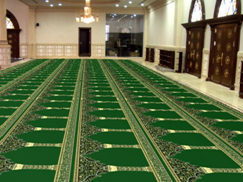
Yet, unfair and inefficient use of Mosque space is frequently seen. In every situation, believers use their conscience by giving importance to first and foremost, a guest's provision to pray rather than being judgmental over gender. For example. If a specific gender's prayer area becomes full and space remains in the other's, that remaining empty space will be utilised to ensure the arriving guests to the already full area are accommodated for prayer in the empty area, rather than turned away from the Mosque and prevented from praying altogether ("...who bar people from the places of worship..." {2:114}) - they realise that what is most important is prayer and serving Allah, rather than being prejudiced over gender. It is not suitable that believers being friends and protectors of one another (9:71), ignore the need of the other but rather should be courteous in ensuring they have the place to perform prayer.
"Have you considered the one who prevents our servant from praying? Have you considered whether he is truly guided or not? Or commands (people) to true righteousness?" (Qur’an 96:9-12)
Many Muslim women are accustomed to finding themselves in a situation where it is prayer time, but the Mosque in front of them does not welcome female visitors. Sometimes, they are uncertain and are left wondering whether they should ask, or skip prayer altogether. It can even be very daunting approaching a male worshipper for assistance as they can be inhospitable.
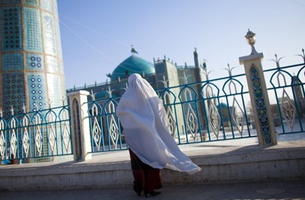
It is un-Quranic for a believing male to ignore a female guest standing outside a Mosque. It feels unconscientious for a believer to pray while knowing other believers are barred from serving Allah inside the Mosque - all while ample space remains within it and rights belong to all people. Every Mosque must give equal rights to women for space as these rights are God-given in the Qur'an.
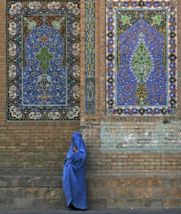
Preventing Women by Dress Restrictions
Another common way some Mosques restrict women is by laying tight requirements on dress code for women wanting to enter a Mosque. The requirements laid fluctuates geographically. However, with regards to this - two important points need to be borne in mind:
1) A Mosque is for all people - for Muslims and non-Muslims to enter ("Children of Adam" 7:31). A Mosque may even be a place where someone who does not believe in the Qur'an (yet), enters to utter a prayer to Allah - such invocations are valid before Allah. Or even to find out more about the Qur'an, or simply to see the structures of the Mosque and be inspired by it. With regards to such people who enter, they are not restricted by Quranic rulings that are intended for believers such as dress code (assuming such a dress code is Quranic). The Quranic teachings are primarily for people who have believed in it. And even then, we cannot force believers to do it (2:256).
Sign-boards are often hung on the entrance detailing requirements for dress, such as covering the hair etc. It is observable that many such female visitors to a Mosque are discouraged and prevented from entering, when the dress they are actually wearing is very much acceptable and is not obscene by any standard.

Since we said Quranic rulings are applicable only to those who believe in it (save rare cases), and that even then no believer should be forced to do something in it - by preventing a woman in this way from entering a Mosque of Allah, it is possible that another soul has missed the chance to learn about the Qur'an and her Creator. What benefit has one got out of forcing her to cover her hair in entering the Mosque?
Wisdom indicates that greater harm is done against inviting people to believe in their creator, the Hereafter and the Qur'an when restrictions such as these discourage and prevent people from entering the Mosques of Allah.
True believers are cognisant of these greater principles and do not lay such restrictions for people in entering the houses of Allah, maintaining the teachings of not barring worshippers and guests as taught in verses 7:31, 22:25 and 2:114.
2) Secondly, the Qur'an has no requirement for many of the dress restrictions for believing women that are commonly accepted:
Therefore, notice-boards should not be hung outside Mosque entrances that limit the access to a Mosque to its female visitors.
Conclusion
To conclude, the environment and layout of Mosques should be such that women can feel free to walk within all areas including the primary prayer space. Inside a Mosque, nobody is a second class citizen and each individual is a guest of Allah and should be treated as such, with courtesy and respect. Primary prayer areas should also accommodate women for prayer in order to be in harmony with Quranic principles. Believing women having equal rights to space inside a Mosque must have similar provision along with men and believing men should ensure that every female guest is welcomed and treated with the same level of courtesy and hospitality extended by Allah.
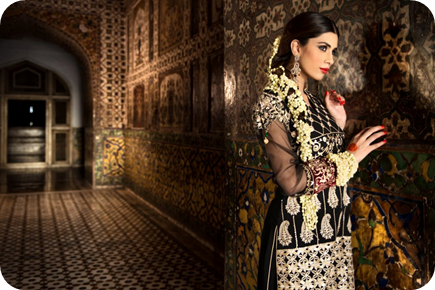
"Set your faces upright at every Mosque and call upon Him (only), making religion purely for Him. He brought you into being, such will be the return." (Qur'an 7:29)
See also:
|
The Claim that Qur'an 33:53 Commands Women to Wear Niqab (Face Veil) |
|
|
"Lower their Gaze" does not mean to Avoid Eye-contact or to not Interact |

Copyright © , QuranicPath. All Rights Reserved.
